Background
Tribe, Laurence Henry was born on October 10, 1941 in Shanghai, China. Son of George Israel and Paulina (Diatlovitsky) Tribe.

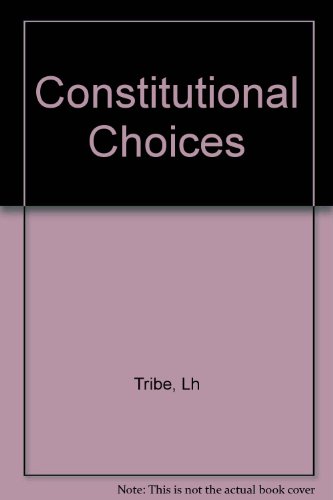
( Constitutional Choices illuminates the world 0f schola...)
Constitutional Choices illuminates the world 0f scholarship and advocacy uniquely combined by Laurence Tribe, one of the nation's leading professors of constitutional law and most successful practitioners before the Supreme Court. In his new hook, Tribe boldly moves beyond the seemingly endless debate over which judicial approaches to enforcing the Constitution are "legitimate" and which are not. Arguing that all claims to legitimacy must remain suspect, Tribe focuses instead on the choices that must nonetheless be made in resolving actual constitutional controversies. To do so, he examines problems as diverse as interstate banking, gender discrimination, church subsidies, the constitutional amendment process, the war powers of the President, and First Amendment protection of American Nazis. Challenging the ruling premises underlying many 0f the Supreme Court's positions on fundamental issues of government authority and individual rights, Tribe shows how the Court is increasingly coming to resemble a judicial Office of Management and Budget, straining constitutional discourse through a managerial sieve and defending its constitutional rulings by "balancing'' what it counts as "costs" against what it deems benefits?' Tribe explains how the Court's "Calculus" systematically excludes basic concerns about the distribution of wealth and power and conceals fundamental choices about the American polity. Calling for a more candid confrontation of those choices and of the principles and perspectives they reflect, Tribe exposes what has gone wrong and suggests how the Court can begin to reclaim the historic role entrusted to it by the Constitution.
http://www.amazon.com/gp/product/0674165381/?tag=2022091-20
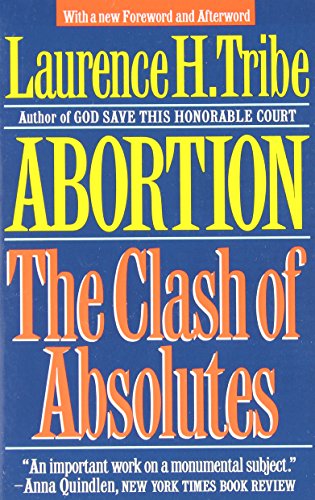
( "An important work on a monumental subject." ―Anna Quin...)
"An important work on a monumental subject." ―Anna Quindlen, New York Times Book Review On profound questions of birth, death, and human choice that are raised by abortion―where opposing sides see no common ground―how can the conflict be managed? The abortion debate in the United States today involves all Americans in complex questions of sex and power, historical change, politics, advances in medicine, and competing social values. In this best-selling book, an eminent constitutional authority shows how the nation has struggled with these questions and then sets forth new approaches that reflect both sides' passionately held convictions. The paperback edition includes discussion of the latest court decisions and excerpts from the major cases, including the Supreme Court's landmark June 1992 decision in Planned Parenthood v. Casey.
http://www.amazon.com/gp/product/0393309568/?tag=2022091-20
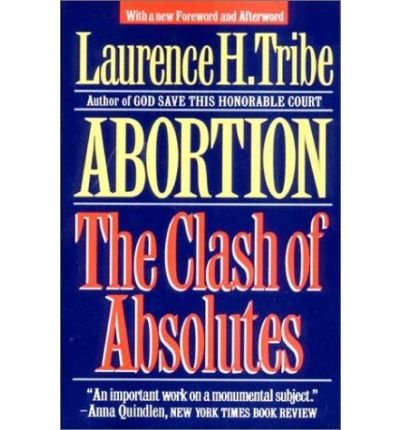
(On profound questions of birth, death, and human choice t...)
On profound questions of birth, death, and human choice that are raised by abortion-where opposing sides see no common ground-how can the conflict be managed? The abortion debate in the United States today involves all Americans in complex questions of sex and power, historical change, politics, advances in medicine, and competing social values. In this best-selling book, an eminent constitutional authority shows how the nation has struggled with these questions and then sets forth new approaches that reflect both sides' passionately held convictions. The paperback edition includes discussion of the latest court decisions and excerpts from the major cases, including the Supreme Court's landmark June 1992 decision in Planned Parenthood v. Casey.
http://www.amazon.com/gp/product/B00FBAYEJM/?tag=2022091-20
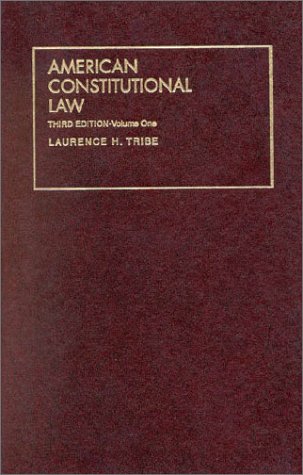
(This textbook focuses on the Constitution’s provisions fo...)
This textbook focuses on the Constitution’s provisions for government structure and on how constitutional structure helps guarantee protection of substantive rights and liberties. It promises to be an indispensable resource for teachers, students, practicing lawyers and judges. This preeminent treatise provides a wealth of original, insightful, and influential analysis of constitutional law doctrine and policy.Professor Tribe's central concern is the Constitution itself, not the Supreme Court as an institution. While addressing relevant issues of institutional capacities and roles, he does not stop at discussing the Court as the right or wrong forum to review a particular issue and render judgment; the more crucial question is whether the judgment itself was right or wrong as an element in the living development of constitutional justice.
http://www.amazon.com/gp/product/1566627141/?tag=2022091-20
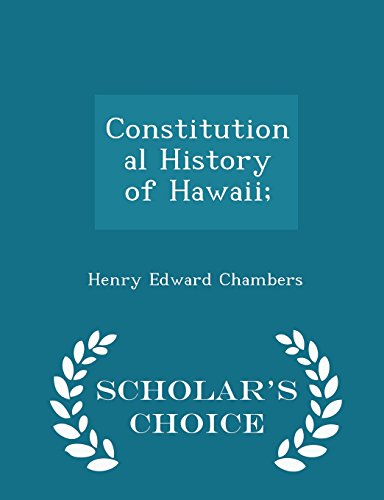
( This work has been selected by scholars as being cultur...)
This work has been selected by scholars as being culturally important, and is part of the knowledge base of civilization as we know it. This work was reproduced from the original artifact, and remains as true to the original work as possible. Therefore, you will see the original copyright references, library stamps (as most of these works have been housed in our most important libraries around the world), and other notations in the work. This work is in the public domain in the United States of America, and possibly other nations. Within the United States, you may freely copy and distribute this work, as no entity (individual or corporate) has a copyright on the body of the work. As a reproduction of a historical artifact, this work may contain missing or blurred pages, poor pictures, errant marks, etc. Scholars believe, and we concur, that this work is important enough to be preserved, reproduced, and made generally available to the public. We appreciate your support of the preservation process, and thank you for being an important part of keeping this knowledge alive and relevant.
http://www.amazon.com/gp/product/1297370074/?tag=2022091-20
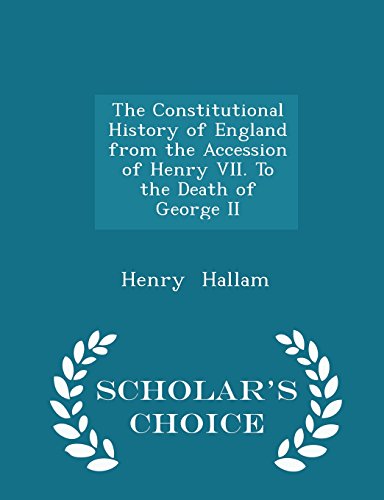
( This work has been selected by scholars as being cultur...)
This work has been selected by scholars as being culturally important, and is part of the knowledge base of civilization as we know it. This work was reproduced from the original artifact, and remains as true to the original work as possible. Therefore, you will see the original copyright references, library stamps (as most of these works have been housed in our most important libraries around the world), and other notations in the work. This work is in the public domain in the United States of America, and possibly other nations. Within the United States, you may freely copy and distribute this work, as no entity (individual or corporate) has a copyright on the body of the work. As a reproduction of a historical artifact, this work may contain missing or blurred pages, poor pictures, errant marks, etc. Scholars believe, and we concur, that this work is important enough to be preserved, reproduced, and made generally available to the public. We appreciate your support of the preservation process, and thank you for being an important part of keeping this knowledge alive and relevant.
http://www.amazon.com/gp/product/129711888X/?tag=2022091-20
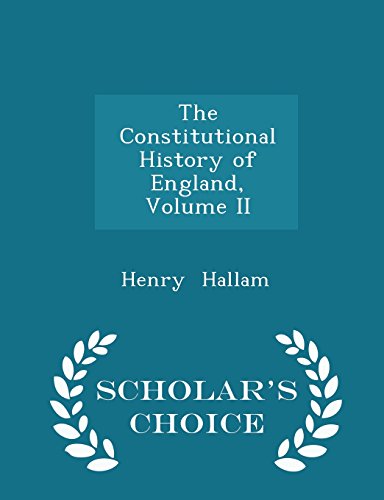
( This work has been selected by scholars as being cultur...)
This work has been selected by scholars as being culturally important, and is part of the knowledge base of civilization as we know it. This work was reproduced from the original artifact, and remains as true to the original work as possible. Therefore, you will see the original copyright references, library stamps (as most of these works have been housed in our most important libraries around the world), and other notations in the work. This work is in the public domain in the United States of America, and possibly other nations. Within the United States, you may freely copy and distribute this work, as no entity (individual or corporate) has a copyright on the body of the work. As a reproduction of a historical artifact, this work may contain missing or blurred pages, poor pictures, errant marks, etc. Scholars believe, and we concur, that this work is important enough to be preserved, reproduced, and made generally available to the public. We appreciate your support of the preservation process, and thank you for being an important part of keeping this knowledge alive and relevant.
http://www.amazon.com/gp/product/1296201317/?tag=2022091-20
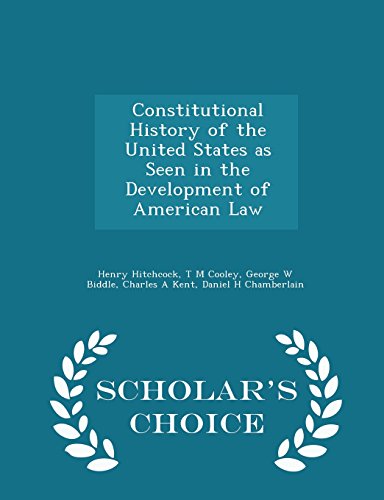
( This work has been selected by scholars as being cultur...)
This work has been selected by scholars as being culturally important, and is part of the knowledge base of civilization as we know it. This work was reproduced from the original artifact, and remains as true to the original work as possible. Therefore, you will see the original copyright references, library stamps (as most of these works have been housed in our most important libraries around the world), and other notations in the work. This work is in the public domain in the United States of America, and possibly other nations. Within the United States, you may freely copy and distribute this work, as no entity (individual or corporate) has a copyright on the body of the work. As a reproduction of a historical artifact, this work may contain missing or blurred pages, poor pictures, errant marks, etc. Scholars believe, and we concur, that this work is important enough to be preserved, reproduced, and made generally available to the public. We appreciate your support of the preservation process, and thank you for being an important part of keeping this knowledge alive and relevant.
http://www.amazon.com/gp/product/1296204332/?tag=2022091-20
Tribe, Laurence Henry was born on October 10, 1941 in Shanghai, China. Son of George Israel and Paulina (Diatlovitsky) Tribe.
AB summa cum laude in Mathematics, Harvard University, 1962. Juris Doctor magna cum laude, Harvard University, 1966. Doctor of Laws (honorary), Gonzaga University, 1980.
Doctor of Laws (honorary), University Pacific, 1987. Doctor of Laws (honorary), American University, 1987. Doctor of Laws (honorary), Illinois Institute of Technology, 1988.
Doctor of Laws (honorary), Colgate University, 1997. Doctor of Humane Letters (honorary), Hebrew University, 1998.
Law clerk to Justice Matthew O. Tobriner California Supreme Court, 1966-1967. Law clerk to Justice Potter Stewart United States Supreme Court, 1967-1968. Executive director technical assessment panel National Academy Sciences, Washington, 1968-1969.
Assistant professor law Harvard Law School, Cambridge, Massachusetts, 1968—1971, professor, 1972-1982, Ralph S. Tyler, Junior professor constitutional law, 1982—2004, Carl M. Loeb university professor, since 2004. Consultant Akin Gump Strauss Hauer and Feld LLP, Washington, since 2007. Chief appellate counsel California Nuclear Litigation, 1978-1983.
Special deputy attorney general Hawaii, 1983-1984. Consultant National Science Foundation, National Endowment Humanities, White House, others. Consultant Marshall Islands for drafting new constitution, 1978-1979.
Chairman Marshall Islands Judicial Service Commission. Consultant Akin Gump Strauss Hauer & Feld.
Bar: California 1966, Massachusetts 1978, United States Supreme Ct 1978, United States Court Appeals District of Columbia Circuit 1978, United States Court Appeals 9th Circuit 1979, United States Court Appeals 1st Circuit 1980, United States Court Appeals 2nd Circuit 1982, United States Court Appeals 3rd Circuit 1991, United States Court Appeals 4th Circuit 1993, United States Court Appeals Federal Circuit 1993.
(On profound questions of birth, death, and human choice t...)
( Constitutional Choices illuminates the world 0f schola...)
(This textbook focuses on the Constitution’s provisions fo...)
( This work has been selected by scholars as being cultur...)
( This work has been selected by scholars as being cultur...)
( This work has been selected by scholars as being cultur...)
( This work has been selected by scholars as being cultur...)
(Nice explanation of how supreme court justices affect our...)
( "An important work on a monumental subject." ―Anna Quin...)
(Book by Tribe, Laurence H)
(Law reference book)
Author: Technology: Processes of Assessment and Choice, 1969, Channeling Technology Through Law, 1973, The American Presidency: Its Constitutional Structure, 1974, American Constitutional Law, 1978, 88, 2000, Constitutional Choices, 1985, God Save this Honorable Court, 1985, Abortion: The Clash of Absolutes, 1990. Co-author: Environmental Protection, 1971, The Supreme Court: Trends and Development, 1979, 80, 82, 83, 84, On Reading the Constitution, 1991. Co-editor: When Values Conflict: Essays on Environmental Analysis, Disourse, and Decision, 1976.Contributor articles to professional journals.
Fellow American Academy Arts and Sciences. Member American Bar Association (Silver Gavel Award 1991), American Civil Liberties Union, Phi Beta Kappa.
Married Carolyn Ricarda Kreye, June 20, 1964. Children: Mark Alexander, Kerry Katrina.
